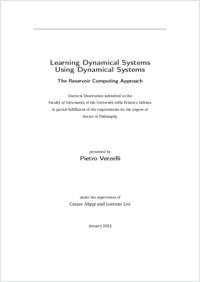Learning dynamical systems using dynamical systems : the reservoir computing approach
- Verzelli, Pietro
- Alippi, Cesare (Degree supervisor)
- Livi, Lorenzo (Degree committee member)
-
10.01.2022
156 p
Thèse de doctorat: Università della Svizzera italiana, 2022
English
Dynamical systems have been used to describe a vast range of phenomena, including physical sciences, biology, neurosciences, and economics just to name a few. The development of a mathematical theory for dynamical systems allowed researchers to create precise models of many phenomena, predicting their behaviors with great accuracy. For many challenges of dynamical systems, highly accurate models are notably hard to produce due to the enormous number of variables involved and the complexity of their interactions. Yet, in recent years the availability of large datasets has driven researchers to approach these complex systems with machine learning techniques. These techniques are valuable in settings where no model can be formulated explicitly, but not rarely the working principles of these models are obscure and their optimization is driven by heuristics. In this context, this work aims at advancing the field by “opening the black-box” of data-driven models developed for dynamical systems. We focus on Recurrent Neural Networks (RNNs), one of the most promising and yet less understood approaches. In particular, we concentrate on a specific neural architecture that goes under the name of Reservoir Computing (RC). We address three problems: (1) how the learning procedure of these models can be understood and improved, (2) how these systems encode a representation of the inputs they receive, and (3) how the dynamics of these systems affect their performance. We make use of various tools taken from the theory of dynamical systems to explain how we can better understand the working principles of RC in dynamical systems, aiming at developing new guiding principles to improve their design.
- Language
-
- English
- Classification
- Computer science and technology
- License
-
License undefined
- Identifiers
-
- RERO DOC 333569
- URN urn:nbn:ch:rero-006-119617
- ARK ark:/12658/srd1319318
- Persistent URL
- https://n2t.net/ark:/12658/srd1319318
Statistics
Document views: 973
File downloads:
- Texte intégral: 587
